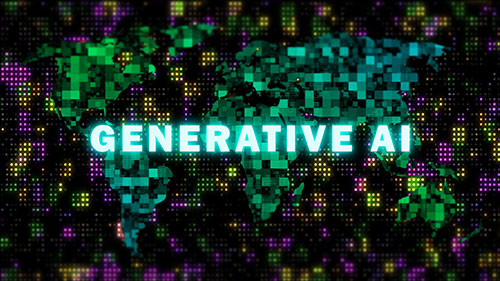Generative AI is booming. Ten trends will soon rock your customers’ world. While cybersecurity spending is up, CEOs lack cyber confidence. And Americans worry about their privacy.
That’s some of the latest from leading IT market watchers. And here’s your Performance Intensive Computing roundup.
GenAI market to hit $143B by 2027
Generative AI is quickly becoming a big business.
Market watcher IDC expects that spending on GenAI software, related hardware and services will this year reach nearly $16 billion worldwide.
Looking ahead, IDC predicts GenAI spending will reach $143 billion by 2027. That would represent a compound annual growth rate (CAGR) over the years 2023 to 2027 of 73%—more than twice the growth rate in overall AI spending.
“GenAI is more than a fleeting trend or mere hype,” says IDC group VP Ritu Jyoti.
Initially, IDC expects, the largest GenAI investments will go to infrastructure, including hardware, infrastructure as a service (IaaS), and system infrastructure software. Then, once the foundation has been laid, spending is expected to shift to AI services.
Top 10 IT trends
What will be top-of-mind for your customers next year and beyond? Researchers at Gartner recently made 10 predictions:
1. AI productivity will be a primary economic indicator of national power.
2. Generative AI tools will reduce modernization costs by 70%.
3. Enterprises will collectively spend over $30 billion fighting “malinformation.”
4. Nearly half of all CISOs will expand their responsibilities beyond cybersecurity, driven by regulatory pressure and expanding attack surfaces.
5. Unionization among knowledge workers will increase by 1,000%, motivated by fears of job loss due to the adoption of GenAI.
6. About one in three workers will leverage “digital charisma” to advance their careers.
7. One in four large corporations will actively recruit neurodivergent talent—including people with conditions such as autism and ADHD—to improve business performance.
8. Nearly a third of large companies will create dedicated business units or sales channels for machine customers.
9. Due to labor shortages, robots will soon outnumber human workers in three industries: manufacturing, retail and logistics.
10. Monthly electricity rationing will affect fully half the G20 nations. One result: Energy efficiency will become a serious competitive advantage.
Cybersecurity spending in Q2 rose nearly 12%
Heightened threat levels are leading to heightened cybersecurity spending.
In the second quarter of this year, global spending on cybersecurity products and services rose 11.6% year-on-year, reaching a total of $19 billion worldwide, according to Canalys.
A mere 12 vendors received nearly half that spending, Canalys says. They include Palo Alto Networks, Fortinet, Cisco and Microsoft.
One factor driving the spending is fear, the result of a 50% increase in the number of publicly reported ransomware attacks. Also, the number of breached data records more than doubled in the first 8 months of this year, Canalys says.
All this increased spending should be good for channel sellers. Canalys finds that nearly 92% of all cybersecurity spending worldwide goes through the IT channel.
CEOs lack cyber confidence
Here’s another reason why cybersecurity spending should be rising: Roughly three-quarters of CEOs (74%) say they’re concerned about their organizations’ ability to avert or minimize damage from a cyberattack.
That’s according to a new survey, conducted by Accenture, of 1,000 CEOs from large organizations worldwide.
Two findings from the Accenture survey really stand out:
- Nearly two-thirds of CEOs (60%) say their organizations do not incorporate cybersecurity into their business strategies, products or services
- Nearly half (44%) the CEOs believe cybersecurity can be handled with episodic interventions rather than with ongoing, continuous attention.
Despite those weaknesses, nearly all the surveyed CEOs (96%) say they believe cybersecurity is critical to their organizations’ growth and stability. Mind the gap!
How do Americans view data privacy?
Fully eight in 10 Americans (81%) are concerned about how companies use their personal data. And seven in 10 (71%) are concerned about how their personal data is used by the government.
So finds a new Pew Research Center survey of 5,100 U.S. adults. The study, conducted in May and published this month, sought to discover how Americans think about privacy and personal data.
Pew also found that Americans don’t understand how their personal data is used. In the survey, nearly eight in 10 respondents (77%) said they have little to no understanding of how the government uses their personal data. And two-thirds (67%) said the same thing about businesses, up from 59% a year ago.
Another key finding: Americans don’t trust social media CEOs. Over three-quarters of Pew’s respondents (77%) say they have very little or no trust that leaders of social-medica companies will publicly admit mistakes and take responsibility.
And about the same number (76%) believe social-media companies would sell their personal data without their consent.
Do more:
- Check out Supermicro AI infrastructure solutions



